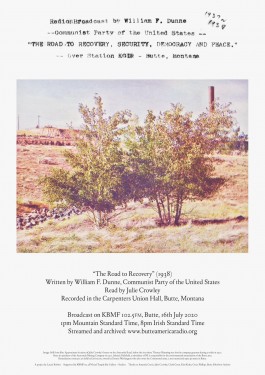<<
'The Road to Recovery' (1938),
Radio broadcast on KBMF102.5 Butte, and poster edition.
The General Mining Law (1872) codified the existing informal system of making mineral claims in order
to encourage settlement of ‘public’ land expropriated from Indigenous North American peoples. Still in effect, the law facilitates untaxed extraction, and allows the transfer of mineral bearing federal land for the 19th century price of $5 per acre.
Marcus Daly founded the Anaconda Company (ACM) on a mineral claim in Butte, Montana, in 1891. Vertical integration of mining, smelting, and processing established the ACM’s monopoly on copper production. The wealth accumulated by the company was predicated on the availability of a largely immigrant work force willing to undertake high risk labor, as well as the theft and devastation of hunting and fishing grounds used by Salish, Cree and Pend d’Oreille peoples. The company utilized conservative trade unions, private gunmen and the national guard to control workers. Racialization was frequently weaponized to fracture any solidarity between a workforce comprised of native and African American workers as well as settlers from places including Ireland, Finland, China and the Balkans. These conditions were also the source of militant organizing; the Industrial Workers of the World (IWW) had a strong presence in Butte, striving for abolition of the wage system by organizing internationally across branches of industry.
In 1971 Salvador Allende’s socialist government seized ACM’s Chilean mine. Following Pinochet’s US-backed coup two years later, Chile paid $250 million in compensation, but the company had lost its hold and was soon purchased by oil firm ARCO. Many in Butte suspect this was in part as a tax write off following the oil crisis. Dennis Washington acquired the Continental mine (Butte) from ARCO in 1984, and runs it as an open pit strip mine using non-unionized labor. Under his firm Envirocon,Washington also holds environmental remediation contracts supplied by ARCO as part of its responsibility to clean up Butte and the surrounding area.
The Port of Montana was established in 1986 through the Foreign Trade Zone act (1934) on former Anaconda rail and water infrastructure as part of a redevelopment program. Essentially a tax exemption zone for manufacture, transportation and storage, the Port of Montana is home to a branch of REC silicon, the worlds largest producer of silane gas; a principle material used in the manufacture of semiconductors and LCD displays.
‘The Road to Recovery’, written by William F. Dunne, was aired in 1938 on KGIR Butte; a low bandwidth station started one year before the Great Depression. The broadcast explains the Communist Party of America’s support of new deal work programs as a response to the increasingly fascist nature of monopoly capital and its barely veiled plan to reshape the depression era US in its own interests.
William F. Dunne founded the Butte Bulletin, a socialist daily paper, in 1917. With the understanding that media is a terrain of class struggle, the bulletin aimed to advance the interest of labor against the ‘copper press’. Dunne also worked to achieve socialism by the ballot box, using local electoral power to support radical organizing and gain urban improvements in Butte. He was elected to Montana State Legislature in 1918 and helped found the Communist Party of America a year later.
Dunne’s original text was read by Julie Crowley and recorded in the former ballroom of the Carpenters Union, the state’s oldest active labor temple and home of KBMF community radio. KBMF is a low-power station licensed by Butte America Foundation, an organization established to educate the public by providing information and tools to uphold the tenets of social justice. Crowley was born on the Anaconda road, a neighborhood purchased and destroyed by the ACM in 1973 to expand its open pit mine. She has campaigned for justice for Thomas Manning – a miner shot by gunmen of the ACM in 1920 during a strike called by the IWW. To mark the 100th anniversary of his death Crowley has organized the production of a tombstone for Manning’s unmarked grave. Funded by local unions, the inscription on the memorial reads “KILLED BY THE COPPER TRUST, THOMAS MANNING, 1895 – 1920”.



